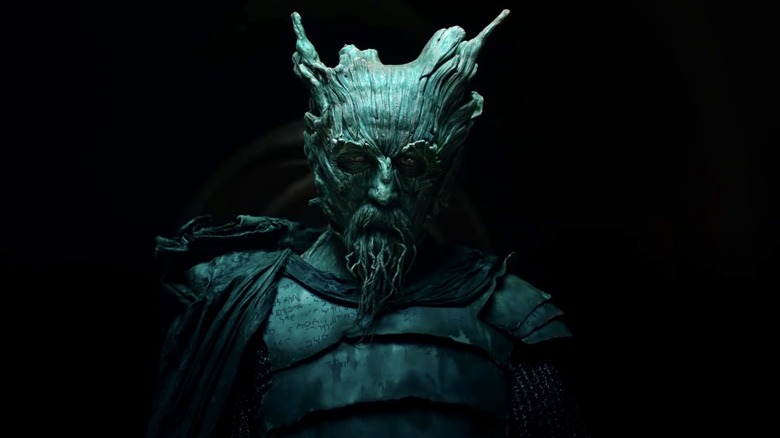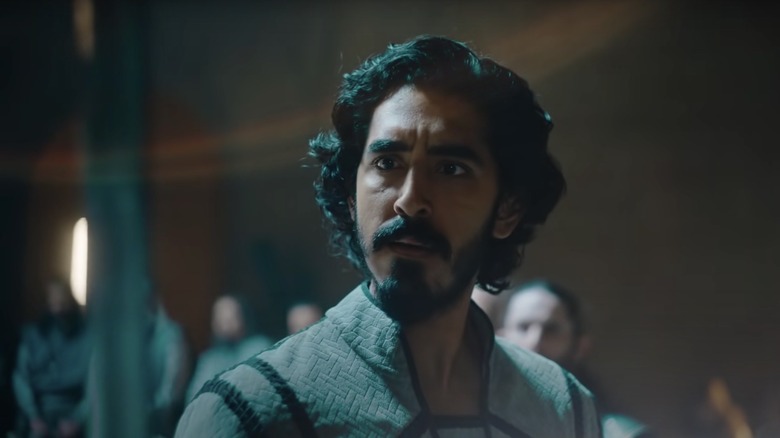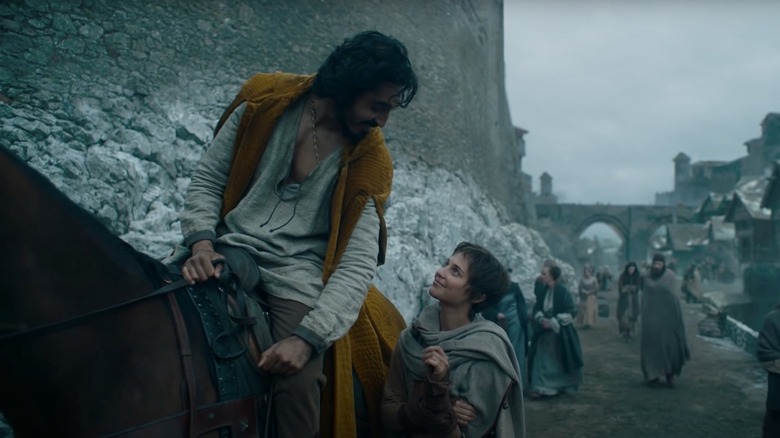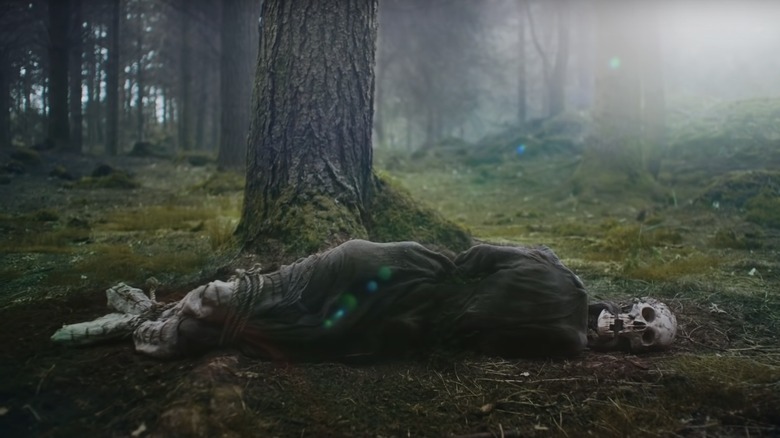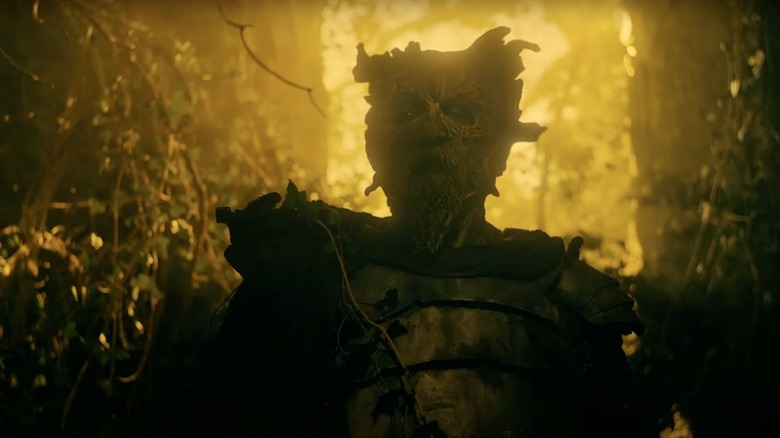The Daily Stream: The Green Knight Was One Of The Best Films Of 2021
(Welcome to The Daily Stream, an ongoing series in which the /Film team shares what they've been watching, why it's worth checking out, and where you can stream it.)
The Movie: "The Green Knight"
Where You Can Watch It: Showtime / FuboTV / DirecTV
The Pitch: King Arthur's nephew sets out on a picaresque yet purposeful adventure en route to the Green Chapel, where the inevitability of death by beheading awaits him.
It's sheer madness that "The Green Knight," writer-director David Lowery's lush, beguiling adaptation of the 14th-century chivalric romance "Sir Gawain and the Green Knight," did not pick up a single Academy Award nomination this year, even in the technical categories. While tepidly received films like "Don't Look Up" scored multiple nominations, and people harped on the snubbing of more populist fare like "Spider-Man: No Way Home" (in all but the Best Visual Effects category, as usual), the Academy at least threw Spidey a bone with its new #OscarsFanFavorite category. And it's somewhat understandable why it might be reluctant to bestow a Best Picture nom on a Marvel mega-sequel that hinges on knowledge of past movies, ends with a literal trailer for the next movie, and is about as far removed from "standalone" as a film can get.
"The Green Knight," on the other hand, has a story that is predicated on the notion of things being finite and contained—within one year and within one transient life. At the same time, it's a more challenging, oblique film, not what you'd call a crowd-pleaser, unless maybe your crowd consists of horror and dark fantasy fans who are excited to see another A24 goat onscreen, along with a talking fox from the "Antichrist" school, who says, "Your doom is at hand," instead of, "Chaos reigns."
Why it's essential viewing
"The Green Knight" is profound in its concerns, which include facing one's death and place in the universe, and realizing the folly of one's ambition when it bends toward some hollow idea of future greatness at the expense of goodness in the here and now. Yet the film's themes would not mean anything if they were not wrapped up in a compelling narrative. This is one that earned a great deal of critical acclaim, scoring a 10 out of 10 in our own Hoai-Tran Bui's review and taking the #1 spot on /Film's Top 10 Movies of 2021 list.
For cinephiles who weren't ready to rush out to theaters during the pandemic, hearing the hype around "The Green Knight" last summer may have inspired some filmic FOMO (fear of missing out, not fear of murderous orangutans). It may have also built up people's expectations too much, as "The Green Knight" would ultimately divide general audiences, some of whom did not have the patience for its meditative pace or abstract visual concepts.
From the perspective of pure craftsmanship and artistry, "The Green Knight" has all the ingredients you'd want, but somewhere along the way, it got left out of the awards conversation, with even the Independent Spirit Awards overlooking it. Dev Patel, Alicia Vikander, Joel Edgerton, Sarita Choudhury, Barry Keoghan, Erin Kellyman, Kate Dickie, Sean Harris, and of course, Ralph Ineson as the Green Knight, anchor the film with strong performances and all have moments to shine. But in a year when numerous below-the-line awards are being relegated to a pre-taping before the live Oscars broadcast, it's worth stating that this movie truly fires on all cylinders. Daniel Hart's music, Andrew Droz Palermo's cinematography, Jade Healy's production design, Malgosia Turzanska's costume design, and the makeup and hairstyling and visual effects teams all work in tandem to bring to life a surreal epic that is spellbinding from the first to last frame.
A portrait of the artist as Sir Gawain
At the beginning of "The Green Knight," Gaiwan is not ready to leave the brothel and become a knight yet because he thinks he's still "got time, lots of time." His mother, perhaps patronizing him, also goes along with this, saying, "There'll be more Christmases, more feasts, more glad tidings."
Up till now, Gaiwan has led the uneventful life of a wastrel, such that he has no tales to tell in King Arthur's court. This leaves him craving glory, as if he can cheat death with it, though he wears yellow, the color of cowardice, and is perhaps ill-suited to the task of actually achieving glory or being a responsible steward for it.
It's not so different from the mindset of some unfulfilled talent, a creative person who dreams of being a great artist but struggles with executing practical plans. Giants won't let Gaiwan stand on their shoulders and he's fundamentally unworthy to be king, but the human ego would ever crown itself, right up until the moment of death.
The Green Knight, as Vikander's character, the Lady, characterizes him in a late monologue, is a symbol of supreme earthiness. He's the dominion of greenness over redness, the lust of humans and dreamers of all stripes who find their reach has exceeded their grasp. In that, comes the certainty of nature overtaking even the decrepit forms of legendary kings. Try as he might, Gaiwan cannot overcome that certainty because he's still subject to mortality, same as we all are.
Gaiwan pins all his hopes on fame and the outcome of his quest, but as the Lord, played by Edgerton, implies, fulfilling it won't suddenly bring about a new him who returns home a changed and honorable man. The movie gives him a chance to be a good person but he fails almost every test put before him: falling for trickery and tossing coins as begrudging "kindness," haggling with ghosts over what they'll give him in exchange for helping them, and betraying his host and the heart of the woman who loved him.
'The world is fit for all manner of mysteries'
"The Green Knight" operates by its own peculiar logic, but it also has the Lord say, "I see things everywhere that bear no logic." Some first-time viewers might feel the same way. Maybe part of the reason why awards voters did not respond to Lowery's cinematic tone poem is that it nuzzles up close to the idea of mystery and is content to rest there, leaving the audience to infer the meaning behind it and its unanswered questions.
Why does Gaiwan's mother summon the Green Knight through sorcery to play a beheading game with him? When the camera does a 360 and reveals Gaiwan's skeleton in the forest, is it just a vision, or did he really die and is the whole rest of the movie his dream before dying à la "Jacob's Ladder?" Later, why do his stolen ax and belt pop up in different hands, and why does the Lady look like Gaiwan's jilted lover, Essel, from back in Camelot?
These are the kinds of questions that arise. One interpretation of the movie that could explain some of them would be that Gaiwan's mother, not knowing whether he will succeed or fail, sets herself against him, acting by proxy in order to test his moral fiber and help him rise to the occasion of earning his selfhood or knighthood. To that end, there's a scene where Winifred's severed head (just roll with the randomness, like the head does) tells Gawain:
"Now I can see thee. And I will strike thee down with every care I have for thee. The Green Knight is someone you know."
Speaking to Vanity Fair, Lowery touched on how he had "failure-to-launch syndrome" as a young man and how Gaiwan's relationship with his mother came to mirror his own. In "The Green Knight," Gaiwan is easily waylaid, prone to hubris over humility, while his mother is a remote, godlike figure, loving him but laying death on him as the wages of sin. Yet before it's all over, she still gives him the chance to redeem himself.
'What more ought there be?'
"The Green Knight" encodes its themes in medieval dialogue, but if you plug in certain words for others, it takes on more clarity. One easy example would be to substitute "life" for "quest" when the Lord, with that sinister, mocking edge of his, says, "You are at the end of your quest, Gawain. A little sooner than you expected, perhaps. But such is the case for us all." This loops back around to what Arthur said to Gaiwan at the beginning: "I do not know of any man who has not marched up to greet death before his time."
Gaiwan runs from death in his mind as he makes his dialogue-free "voyage home" in a sequence that's been compared to "The Last Temptation of Christ." At the site of his beheading, he has a vision of continued consciousness, a life or afterlife for himself. He asks his executioner, "Is this really all there is?" And the Green Knight responds, "What else ought there be?" This seems informed by Lowery's perspective as an atheist and materialist who was raised Catholic, with the concept of purgatory as a "gray hinterland" crawling into "The Green Knight" as more of an outright landscape than it did in his last film, "A Ghost Story."
Only by being a "brave knight" and accepting his moral failings along with his earthbound fate can Gaiwan finally align with the Green Knight and achieve true growth. He's undergone a real character arc and changed for the better. Now, off with his head.
Award ceremonies like the Oscars are their own kind of fleeting glory, not unlike the tales that accompany Gaiwan for "a too quick year" after he first faces off with the Green Knight. To some, they may now be altogether irrelevant, but they do still matter to the degree that they can bring attention to movies people might otherwise miss. In that sense, it's a shame "The Green Knight" won't receive the extra boost it might get from some awards recognition. However, this is a film of ethereal beauty that can withstand such slights. Like Gaiwan himself, riding out on horseback in an extended tracking shot, it may still have a long word-of-mouth journey ahead of it.
